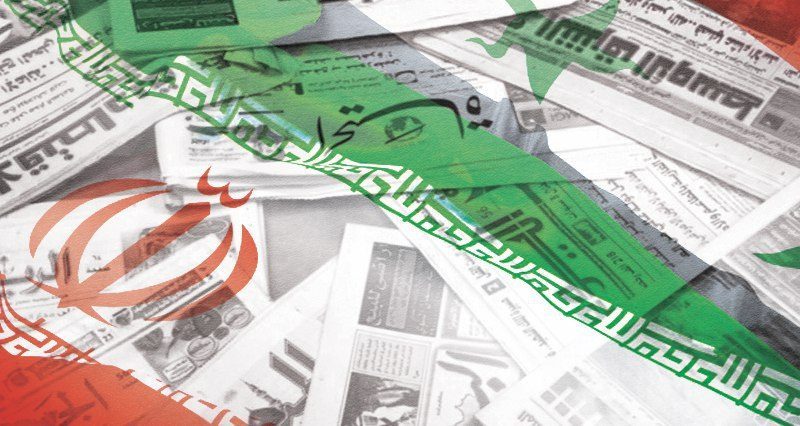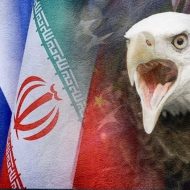Explosions and fires
A series of mysterious explosions and accidents have shocked Iran overthe last month. The incidents began on May 24 when two units of the Tabriz thermal power plant were shut down and a boiler at Imam Khomeini’s port refinery exploded.
On June 26, there was a powerful explosion at a missile plant near Tehran. On June 30, there was a “gas explosion” at a Tehran clinic. The explosion and the subsequent fire in a clinic in the north of Tehran killed at least 19 people.
ایران و آتش:
۱۴خرداد؛ آتشسوزی بخشی بخشی از انبارهای فولاد خوزستان.
۱۴خ؛ یکی از واحدهای پالایشگاه تهران.
۱۴خ: حریق گسترده در مزارع گندم سمنان.
۱۳خ؛ تعدادی واگن فرسوده شرکت رجا در ایستگاه آپرین اسلامشهر.
۱۳خ؛ منطقه جنگلی افرا تهران.(عمدی اعلام شد.)
یک/۳— Mahtab Gholizadeh (@mahtabgholizade) June 3, 2020
On July 2, there was another explosion near the nuclear power plant in Natanz, which damaged the production building. On July 4, there was an explosion at the power plant in Ahvaz, Khuzestan province. On the same day and the same province there was a chlorine leak at the Karun chemical plant. According to IRNA, 70 workers fell ill and were taken to hospital with symptoms of chlorine poisoning. On July 8, two subway cars went off the rails in Tehran.
At last on July 9,there was another explosion in Iran – local resources reportedan explosion of a warehouse of rocket-artillery armament in the areaof Tehran. No official confirmation, however, has been received.
In addition, mysterious fires have appeared here and there in Iran over the past months.
On June 2, there was a fire in Chitgar forests west of Tehran. Local residents complain that the authorities have not taken adequate measures for several hours. On June 3, there was a fire in a warehouse area of the Khuzestan Metallurgical Company. One person was killed. On the same day, there was a huge fire on wheat farms in Semnan province.
On June 5, the theft of cables on the Ahwaz power grid left the hospital and the huge area without electricity for many hours.
Wild fires broke out in Khuzestan and Bushehr. In the past 74 days, 240 wildfires have been registered in forests and meadows in 11 provinces.
In the last month, afire raged June 6 in the area adjacent to Evin Prison in Tehran, June 7 – in the National Park in Jahrom, June 12 near the Armenian Church of St. Mary in the Iranian city of Hamedan, June 14 – fire in a storage of 10,000square meters in Shurabad, Tehran.
Strike against thenuclear program?
According to the world media quoting Iran’s state news agency IRNA, Iran believes that the explosion at Natanz could have been caused by “hostile countries, especially the Zionist regime [Israel] and the US”.
Iranian civil defense officials promised to respond if it turns out that Iran fell victim to a cyber-attack. In turn, “Middle Eastern intelligence officials” told the New York Times that Israel is behind the explosion at the nuclear facility in Natanz. (https://www.nytimes.com/2020/07/05/world/middleeast/iran-Natanz-nuclear-damage.html)
An American source told Associated Press that an explosion at the Natanz enrichment plant could damage centrifuge production lines, which could slow Iran’s nuclear program.
Recall that Iran, after US President Donald Trump withdrew the US from theJoint Comprehensive Action Plan, Irantook a number of steps towards the resumption of theprogram. At the same time, the top leadership of the Islamic Republic assures that Tehran does not intend to acquire nuclear weapons.
Shortly before the start of the chain of catastrophes in Iran, the media reported on the exchange of cyberstrikes between Israel and Iran.
On April 24 and 25, six pumping stations in central Israel underwent a cyberattack, after which the local media rushed to blame Iran. They could not, however, provide any concrete evidence.
Two weeks later, Israel, avoiding direct accusations against Tehran, responded with an attack on Iranian port computer networks. The bustling Iranian port of Shahid Rajai, near the city of Bender Abbas, through which about half of Iran’s foreign trade flows, was attacked. On May 9, computers regulating the loading and unloading of containers, navigation in the water area and road traffic on the port’s territory suddenly failed. The failure resulted in a transport collapse that lasted several days.
In 2009-2010, five Iranian organizations involved in the production of gas centrifuges for uranium enrichment were attacked in three stages by modifications to the Stuxnet virus. As a result, about one thousand centrifuges at the Natanz enrichment facility were disrupted. This is the first major cyber attack known to have resulted in physical damage to the equipment. The operation was conducted by American and Israeli specialists.
Also earlier, mysterious deaths of Iranian nuclear scientists were associated with the actions of Israeli security services.
Israeli Foreign Minister Gabi Ashkenazi hinted that the Israeli authorities may still be involved in the explosion in Natanz.
“We have a long-term policy over the course of many administrations not to allow Iran to have nuclear capabilities,” he said.
“We take actions that are better left unsaid,” Ashkenazi stressed.
In July, Israeli Prime Minister Benjamin Netanyahu extended the authority of Mossad Yosi Cohen, head of the intelligence agency, until June 2021. This is stated in a statement of the Prime Minister’s Office, which notes that the decision was taken in connection with “security problems. It is possible that the Israeli Prime Minister decided not to change the unpopular head of the Mossad in the government coalition established in May, as the reshuffles may prevent the effective continuation of the sabotage campaign against Iran, which is now attributed to the Jewish state.
Tensions are rising
In addition to attempts to disrupt Iran’s nuclear and missile program, the acts of sabotage by foreign actors may stirup protest sentiment. Many accidents and catastrophes could demonstrate to Iranian citizens that the authorities are unable to secure critical infrastructure and protect the lives and health of citizens. It also makes it possible to accuse the authorities of negligence and corruption, which have allegedly led to man-made accidents.
According to an Israeli analytical portal close to the military and intelligence circles of DEBKAfile, not only the explosion in Natanz, but many other accidents in Iran are the result of sabotage by the United States, Israel and Saudi Arabia:
“DEBKAfile’s sources conjecture from the targets selected is that a joint Israel-US-Saudi operation is likely ongoing against Iran, since no harsh US sanctions nor a deadly coronavirus outbreak has been able to restrain the Islamic Republic from its intense drive to weaponize its nuclear program.”
All three countries are regional enemies of Iran. Israel is concerned about Tehran’s missile programme and Iran’s presence in Syria. The United States and Saudi Arabia accuse Iran of launching missile attacks on facilities in Saudi Arabia.
The Iranian BBC received a letter from obscure group Cheetahs of the Homeland, which claimed responsibility for the explosion in Natanz.
Hrs bfore any news ab incident at Iran facilities, a group of "dissidents in the security apparatus" called "Homeland Cheetahs", in an email to BBC Persian claimed attack on "Kashan nuc site & Natanz assembly structure”, saying they targeted overground so it “couldn't be denied”. https://t.co/3pgxG0E4gK
— Hadi Nili (@HadiNili) July 2, 2020
There was no mention of the organization before the events of July 2. Therefore, the report of “Cheetahs” may be an input from foreign special services or opposition groups in order to cause unnecessary tension and increased inspections of the personnel of enterprises by Iranian security agencies.
Sanctions factor
Another or additional reason for such a large number of man-made disasters in Iran in recent months may be the US sanctions that prevent the country from buying modern equipment, upgrading technologies or purchasing them on the foreign market. At the same time, equipment in many technological industries and the infrastructure itself has become very worn out and needs to be replaced.
Sanctions are severely limiting the technological and financial capabilities of the Iranian economy, hampering further development or at least preservation of existing infrastructure.
At the same time, American sanctions and the inability of European countries to create a mechanism to circumvent them leave Iran with no choice but to seek assistance from China.
“Iran-China 25-Year Comprehensive Partnership Document”, published this week by IranWire portal, implies strengthening cooperation between the countries. In exchange for oil supplies to China, China is ready to create modern infrastructure in Iran and work together on economic, political and military issues.
There are doubts about the authenticity of this document. Thismay itself be an element of the information warfare against Iran, designed to present the country’s leadership asChinese puppets. Such rumors have already sparked a reaction from former Iranian President Mahmoud Ahmadinejad, who stated that “It is not valid to enter into a secret agreement with foreign parties without considering the interests of the Iranian nation and against the interests of the country and the nation, and the Iranian nation will not recognize it”.
However, in the Arab media, there are suggestions that China may receive bases in Iran and the possibility of deploying troops, although this contradicts all the attitudes of the Islamic Republic, which has traditionally been strongly opposed to the basing of foreign military personnel on its territory.
Global context
One way or another – Iran is forced to interact with China more and more actively. The bilateral cooperation treaty for 25 years is indeed in preparation, although its contents are not made public.
Iranian Foreign Ministry spokesman Abbas Mousavi assured journalists the day before that national interests remain the only guiding principle for the Ministry of Foreign Affairs in the development of this document and the negotiations are being held as carefully and cautiouslyas possible.
It is possible that foreign forces are trying to influence the final forms of the agreement through inflaming tension and provoking a split in Iranian society. On the other hand, sabotage could show China that it is betting “on the wrong player” in the region.
At the same time, China is ready to help Iran with rearmament, which says Beijing regards Tehran as its priority partner in the region. Thus, on June 30, China’s representative to the UN said that China opposes the US desire to extend the arms embargo against Iran.
In July 2015 the five-year term expired, during which restrictions on arms exports should be removed from Iran in accordance with the Joint Comprehensive Action Plan. The United States hopes, however, to extend the arms embargo through the UN Security Council.
However, China, and with it Russia, are interested in selling their arms to Iran. Russia can offer Iran air defense systems – including S-400s, as well as military aircraft, including MiG-29s – that are no longer used in the Russian air force, but as events in Libya and Syria show, are in demand in the Middle East. China can also offer aircraft, drones in the manufacture of which the Chinese have become a recognized international leader, as well as the most important missile equipment and technology.
Who is really sending warplanes to Haftar and why the US is blaming Russia
Unlike the US and Russia, China has not been limited by the INF treaty for 30 years. Therefore, China can offer medium-range missiles to Iran. Saudi Arabia has already acquired Chinese missile technologies in the past, and this factor increases the interest of Iran, which is seeking parity with Saudis.
Such a proposal itself may also become a very significant factor in Beijing’s pressure on the Gulf countries, which is very important in the context of the global confrontation between the United States and China.
Thus, the sanctions that the US hoped to exsanguinate Iran have brought Tehran closer to itsmain global rival (sanctions against Russia have done the same).
US pressure is formalizing a bloc of anti-American countries, where Russia and Turkey cooperate in defense and together with Iran confront the US in Syria, Iran supplies Venezuela with gasoline and food, China offers assistance to Iran and together with Russia conducts exercises in the Arabian Sea – demonstrating the possibility of projecting force into the Persian Gulf.
Diversions against Iran in this context are directed not only against this particular country, but against the entire global emerging anti-American, multipolar bloc of sovereign powers.









Leave a Reply